Regional and Senate Elections in the Czech Republic, September 2024
Issue
Issue #5Auteurs
Michal Kubát , Michal Pink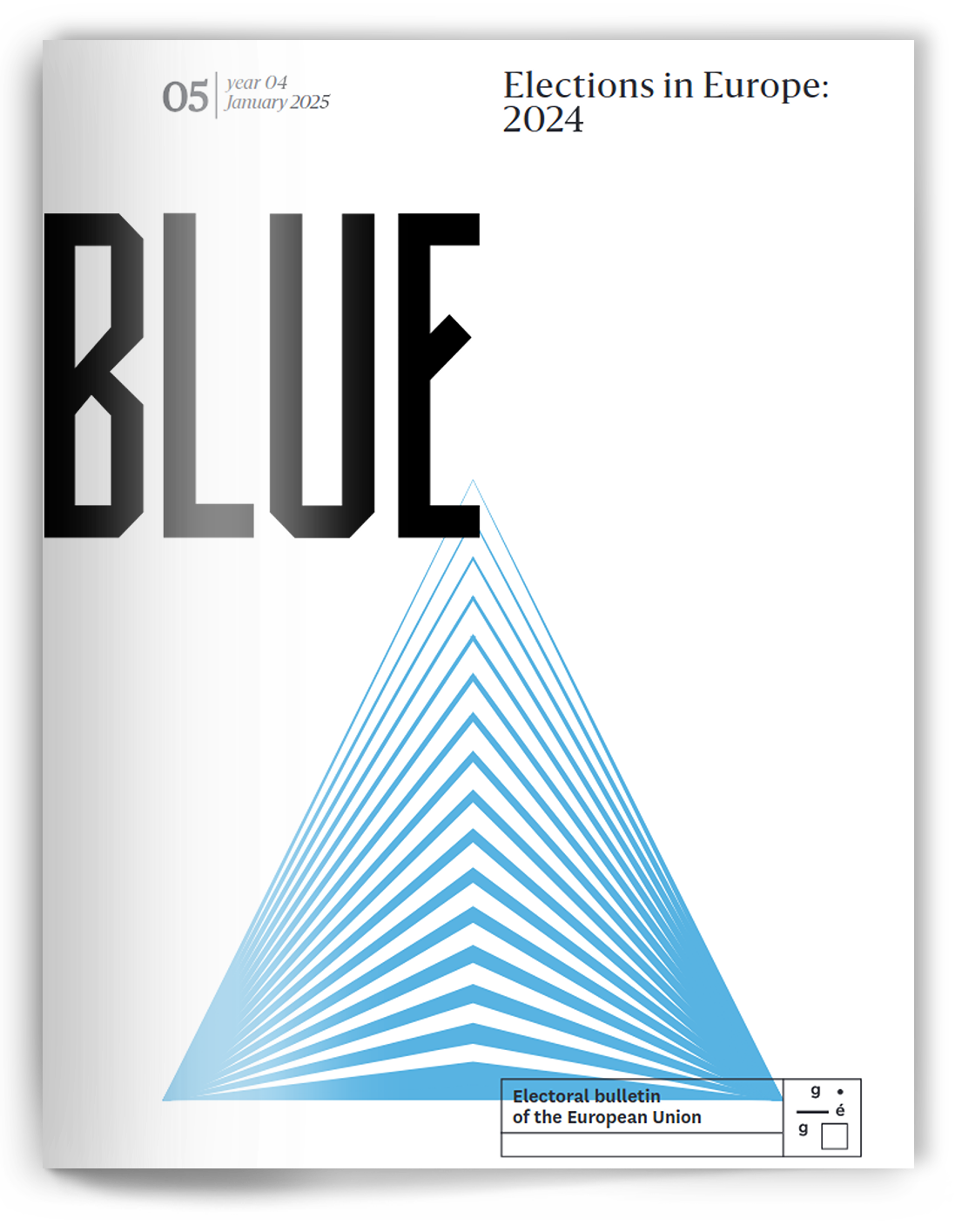
Issue 5, January 2025
Elections in Europe: 2024
This paper discusses the regional and senate elections that took place in the Czech Republic in September 2024. The regional elections and the first round of the senate elections were held on 20 and 21 September. The second round of Senate elections was held a week later, on 27 and 28 September. Voting in Czechia traditionally occurs on Fridays and Saturdays.
The text is divided into several sections. We first describe the electoral system and introduce the broader context in which these elections occurred. We then analyze the results in terms of both party support and turnout. Finally, we discuss the impact of these elections on regional and national politics.
Our article is based on primary sources, official statistics, and media coverage. Given the recentness of the elections, more complete political science or constitutional law analyses are still to appear.
Electoral System
Regional Elections
It was not until 2000 that Czechia was divided into 13 regions, with Prague designated as the capital city with a special regional status. Simultaneously, directly elected regional governments were established, which have become an essential part of the Czech political system. The first regional elections were held in 2000, and new elections have occurred every four years since then. In the regional elections, political parties compete for a total of 675 seats, with the size of each regional assembly varying according to the population of the region. The assemblies of the three largest regions have 65 members, those of the smaller regions have 55, and the smallest region has 45. Each region forms its own single constituency.
In each region, a system of party-list proportional representation is used in each region to elect the members of the regional assemblies. Voters can cast up to four preferential votes for the candidates on the party list they choose. These votes modify the ranking of candidates defined by the parties. This allows for some personalization of the vote and may induce independent (candidate-centered) campaign activity. A modified d’Hondt method is used to convert votes into mandates. Parties (or coalitions) must exceed a 5% electoral threshold to gain seats.
Following the elections, each assembly elects a regional governor (hejtman) and additional council members to form the regional executive. The regional executive depends on the ongoing support of a majority in the assembly, which can decide to recall and replace the governorat any time. This creates a quasi-parliamentary system at regional level, whereby the regional executive is accountable to the legislature and can be recalled if the political majority in the assembly changes (Act 129/2000).
Senate
Although the Senate, the second chamber of Parliament, was established by the Constitution adopted in December 1992, the first Senate election was not held until 1996. Czech Senate elections use a two-round system to elect 81 senators from single-member constituencies. In the first round, candidates need an absolute majority of the vote to be elected. Otherwise, a second round is held, to which advance the two candidates who obtained the most votes in the first round. In the second round, the candidate with the highest number of votes is elected. The term of office is six years, with one-third of the senators (27) being elected every two years. As a result, senate elections are held frequently, with a total of 15 elections from 1996 to 2024 (not counting by-elections). Since 2000, all Senate elections have been held simultaneously with regional or municipal elections (Act 247/1995; volby.cz, 2024).
Context
The regional and senate elections took place in a complex political situation. After the 2021 parliamentary elections, a broad coalition government of five parties led by Prime Minister Petr Fiala was formed. The coalition consisted of the right-wing parties Civic Democratic Party (ODS) and TOP 09, the Christian Democratic Union-Czechoslovak People’s Party (KDU-ČSL), the centrist party Mayors and Independents (STAN), and the progressive Pirates. Despite the large number of parties and significant ideological differences between them, the coalition was maintained through October 2024, when the Pirates left the coalition. The Pirates left the government after PM Fiala dismissed their chair, Ivan Bartoš, from his position as Deputy Prime Minister for Digitalization and Minister for Regional Development, claiming that he failed to handle the digitisation of construction procedures. This happened just after the regional and senate elections. However, even after the Pirates left the government, the governing coalition maintained its majority in the Chamber of Deputies.
The government faced several domestic political crises and challenges, the most serious of which was the high inflation of 2022–2023. Dissatisfaction with the economic situation was the leading (but not the only) cause of the government’s extreme unpopularity. Around 70% of people distrusted the executive branch (Stuchlíková, 2023; Červenka, 2024). However, this did not manifest dramatically in the European Parliament elections of June 2024, when the opposition populist party ANO won 26.14% of the vote, and the coalition of ruling parties, SPOLU 1 (composed of ODS, TOP 09, KDU-ČSL) came in second with 22.27% (STAN: 8.7%; Pirates: 6.2%; see volby.cz, 2024). Moreover, electoral polling for the Chamber of Deputies have long favored ANO, with levels exceeding 30%. The next election for the Chamber of Deputies will be held in autumn 2025. In this context, it can be noted that the likely future winner of these elections, ANO, has recently shifted significantly towards nationalist and far-right positions. This shift may impact both domestic politics and Czechia’s future international political position.
The regional and senate elections were marred by the tragic floods of September 2024, which primarily impacted northern Moravia and Silesia. While the floods did not directly impacted the election results, but had an effect on voter turnout in the affected regions.
Results
Regional Elections
Figure a shows the regional results in terms of the number of regional MPs elected. The national opposition party ANO took first place. In second place, we find STAN with a maximum of 20 seats in two regions. Other relatively successful parties include a group of government parties dominated by the ODS, which, in one case (South Bohemia), were able to win an absolute majority of seats. The ODS is also represented on joint candidate lists with smaller government parties under the SPOLU brand, as they did in previous parliamentary elections in 2021. Both the communist party, running under the Stačilo! (Enough!) brand and the far-right Freedom and Direct Democracy (SPD) obtained more seats than at national level (32 and 37, respectively). The regional elections were disappointing for the Pirates, who won only three mandates in one region and failed to cross the 5% threshold in others. Regional parties lost the elections. In total, they have marginal representation in only two regions.
Overall, it can be said that the regional elections demonstrated broad support for the opposition party ANO as well as continued support for a diverse group of government parties, excluding the Pirates. There was also lower representation of two political parties on the far left and far right side of the spectrum.
| Region | ANO | ODS | SPOLU | Stačilo! | STAN | SPD | Piráti | KDU-ČSL | Reg. | SD |
| Central Bohemia | 25 | 13 | 3 | 20 | 4 | |||||
| South Bohemia | 17 | 34 | 4 | |||||||
| Plzeň | 24 | 9 | 4 | 8 | 3 | 3 | 4 | |||
| Karlovy Vary | 28 | 3 | 7 | 4 | 3 | |||||
| Ústí nad Labem | 26 | 7 | 5 | 7 | 6 | 4 | ||||
| Liberec | 18 | 5 | 20* | 2 | ||||||
| Hradec Králové | 18 | 13 | 2 | 6 | 3 | 4 | 3 | |||
| Pardubice | 15 | 5 | 3 | 3 | 2 | 6 | 11 | |||
| Vysočina | 18 | 11 | 3 | 4 | 2 | 4 | 4 | |||
| South Moravia | 22 | 31 | 4 | 4 | ||||||
| Olomouc | 26 | 5 | 4 | 9 | 5 | 6 | ||||
| Zlín | 20 | 5 | 3 | 5 | 2 | 10 | ||||
| Moravia-Silesia | 35 | 10 | 5 | 11 | 4 | |||||
| Sume | 292 | 81 | 70 | 32 | 90 | 37 | 3 | 34 | 7 | 18 |
* Running under the SLK (Mayors for the Liberec Region) brand.
Highlighted in bold are the majorities that served to form regional governments. See one of the following subsections for more on this topic.
KDU-ČSL: Christian Democratic Union-Czechoslovak People’s Party; ODS: Civic Democratic Party; Piráti: Pirates; Reg.: regional parties; SD: SOCDEM (Social Democrats); SPD: Freedom and Direct Democracy; SPOLU: Together; Stačilo!: Enough!; STAN: Mayors and Independents.
Source: volby.cz (2024).
Senate
In the Senate elections, 27 senators were elected, of which five in the first round. Twenty-six of the elected senators represented a party or a coalition of parties, and only one was an independent candidate. Ten of the elected senators represented the opposition, while the remaining 17 were more likely to be politically aligned with or supported by the ruling parties. At first glance, such numbers suggest the success of the ruling parties, but if we look at the parties’ gains and losses in terms of the total number of seats in the Senate, we see that ANO gained the most seats (+7) while ODS lost the most seats (-5). The movements of the other parties are in the order of one seat won or lost. The Senate elections, therefore, confirmed what the regional elections also showed: increasing support for the opposition (mainly ANO) and decreasing support for the ruling parties.
| Party | Gov. / opp. (new senators) | Seats won | Total number of seats | Gains/losses | |
| ANO | opposition | 8 | 12 of 81 | +7 | |
| STAN | government | 6 | 18 of 81 | +1 | |
| ODS | government | 5 | 18 of 81 | –5 | |
| KDU-ČSL | government | 2 | 12 of 81 | 0 | |
| TOP09 | government | 2 | 7 of 81 | +1 | |
| SD | opposition | 1 | 1 of 81 | 0 | |
| SEN21 | pro-government | 1 | 4 of 81 | 0 | |
| Přísaha | opposition | 1 | 1 of 81 | +1 | |
| NK | pro-government | 1 | – | – | |
| Total | 27 | – | |||
NK: Independent Candidate; Přísaha: Oath). Other abbreviations: see Figure a.
Source: volby.cz (2024).
Turnout
Turnout was low. In the regional elections, it was 32.91%, with only minor regional differences. The highest turnout was in the South Bohemia region (36.66%), while the lowest was in the Ústí nad Labem region (28.13%). In the Senate elections, turnout was even lower. In the first round, turnout was 30.47%; in the second round, where turnout has traditionally been much lower, 17.54%. This was the lowest turnout in regional elections since 2004, when only 29.62% of eligible voters cast ballots. Turnout in the Senate elections is similar to the past; for summary data on voter turnout in all elections, see volby.cz (2024).
Impacts and Consequences
Formation of Regional Governments
Figure c shows the winners in individual regions, how the regional executive coalition led by the regional governor was formed, and whether it aligned with the national government. In most regions, the national opposition party, ANO, won the elections. Still, it only occasionally succeeded in obtaining the position of governor and becoming the head of the regional executive. A good example is the Central Bohemian Region, where ANO remained in the opposition despite winning the election. In peripheral regions such as Karlovy Vary and the Moravian-Silesian region, ANO won and obtained most mandates. In the first case, the newly elected governor used his majority to govern without coalition partners; in the second case, ANO created a coalition with the far-right SPD. Similar coalitions of ANO, SOCDEM, and the far right have also been established in the Olomouc and Vysočina regions. It is not yet possible to confirm whether the party is thus preparing the ground for cooperation at the national level. Among the government parties, the ODS won a majority in the South Bohemian region, where they did not need to form a coalition to govern.
The government parties won another victory in the South Moravian region, where they had formed a broad pre-election coalition. They needed only one coalition partner, STAN, to achieve the required parliamentary majority. The number of ANO governors (7) is thus lower than the number of victories of the party in regional elections, yet still managed to elect the most governors. Another four governors are member of government parties (ODS – Martin Kuba, KDU-ČSL – Jan Grolich, STAN – Martin Půta) and the marginal SOCDEM party (in the Pardubice region). However, some pro-government candidates, most notably Martin Kuba, tried to downplay their affiliation with the government parties and presented themselves as independent regional politicians. Among them, Martin Půta ran under the Mayors for the Liberec Region (SLK) label, which is officially a part of STAN but has its own local brand.
| Region | Winner | Regional executive | Regional governor | Congruence with national government |
| Central Bohemia | ANO | SPOLU + STAN | STAN | Yes |
| South Bohemia | ODS | ODS | ODS | Yes |
| Pilsen | ANO | ANO, STAN, reg. | ANO | No |
| Karlovy Vary | ANO | ANO | ANO | No |
| Ústí nad Labem | ANO | ANO, ODS, reg. | ANO | No |
| Liberec | SLK | SLK, ODS | SLK | Yes |
| Hradec Králové | ANO | ANO, SD, SPD | ANO | No |
| Pardubice | ANO | ANO, ODS, TOP09, KDU-ČSL, SD | SD | No |
| Vysočina | ANO | ANO, SD (supported by far-right parties) | ANO | No |
| South Moravia | SPOLU | SPOLU, STAN | SPOLU | Yes |
| Olomouc | ANO | ANO, SPD, far-right parties | ANO | No |
| Zlín | ANO | ANO, STAN | ANO | No |
| Moravia-Silesia | ANO | ANO, SPD | ANO | No |
SLK: Mayors for the Liberec Region. Other abbreviations: see Figure a.
Source: volby.cz (2024), own work.
Senate
Even though the ANO opposition movement gained significant strength – this election represented a kind of breakthrough for ANO, given its historically poor performance in Senate elections – and the ruling ODS weakened, the Senate elections did not change the overall composition of this chamber of parliament. The ruling and pro-government forces retained their majority. This is reflected in the election of the chamber’s new leadership. The current President of the Senate, Miloš Vystrčil (ODS), was confirmed in office. In summary, the Senate will not become an opposition chamber to the Chamber of Deputies (and the government) for the time being, as the same majorities will remain in both chambers. Therefore, there will be no significant changes in the functioning of parliament and the entire democratic regime. However, this may change after the 2025 Chamber of Deputies election.
Parties and Party System
The regional and Senate elections had little impact on the parties or the party system, except for the Pirates. In response to their failures in both elections, the entire party presidency resigned, including longtime chairman and former vice-prime minister Ivan Bartoš. Bartoš announced that he would not run for any party positions. This was the second electoral failure in a row for the Pirates, who were also disappointed with their result in the 2024 European Parliament elections, in which they received only 6.20% of the vote and one seat (volby.cz, 2024). On November 9, 2024, Zdeněk Hřib, the former mayor of Prague, was elected chairman. Hřib declared that he wanted to move the party more towards the political center. As a consequence, some representatives of the party’s left wing left the party. The Pirates are now set to become a more centrist party (Petrů, 2024). The effect this will have on their electoral support and position in the party system cannot yet be estimated.
Acknowledgment: This output was supported by the NPO “Systemic Risk Institute” number LX22NPO5101, funded by European Union – Next Generation EU (Ministry of Education, Youth and Sports, NPO: EXCELES).
The data
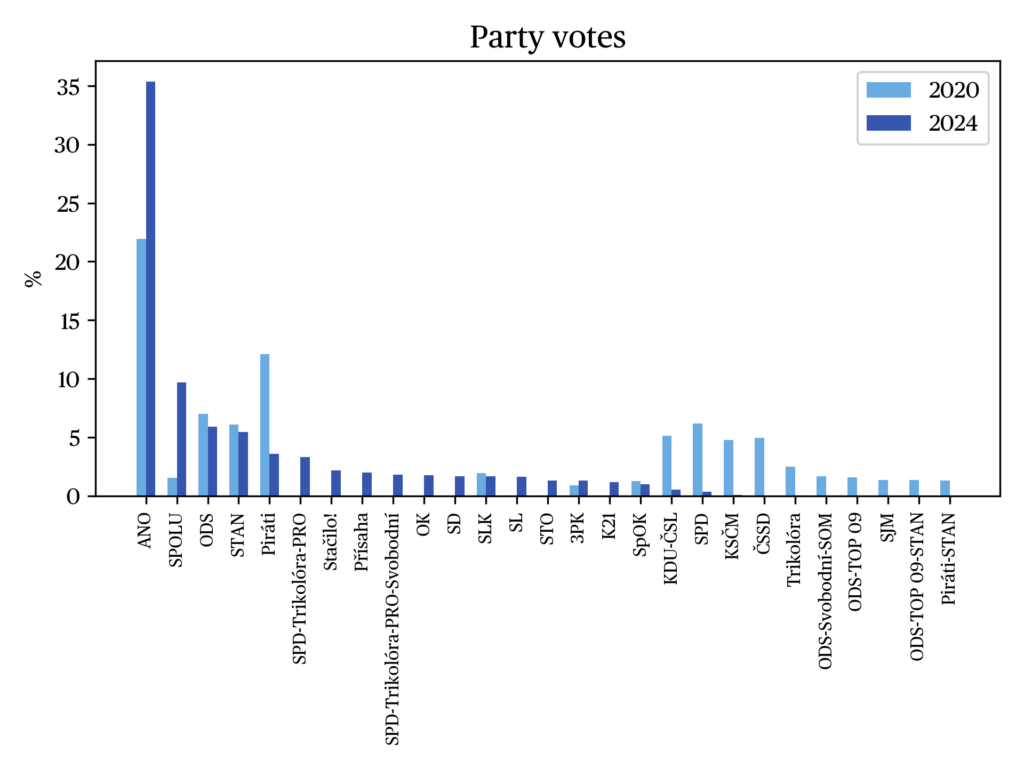
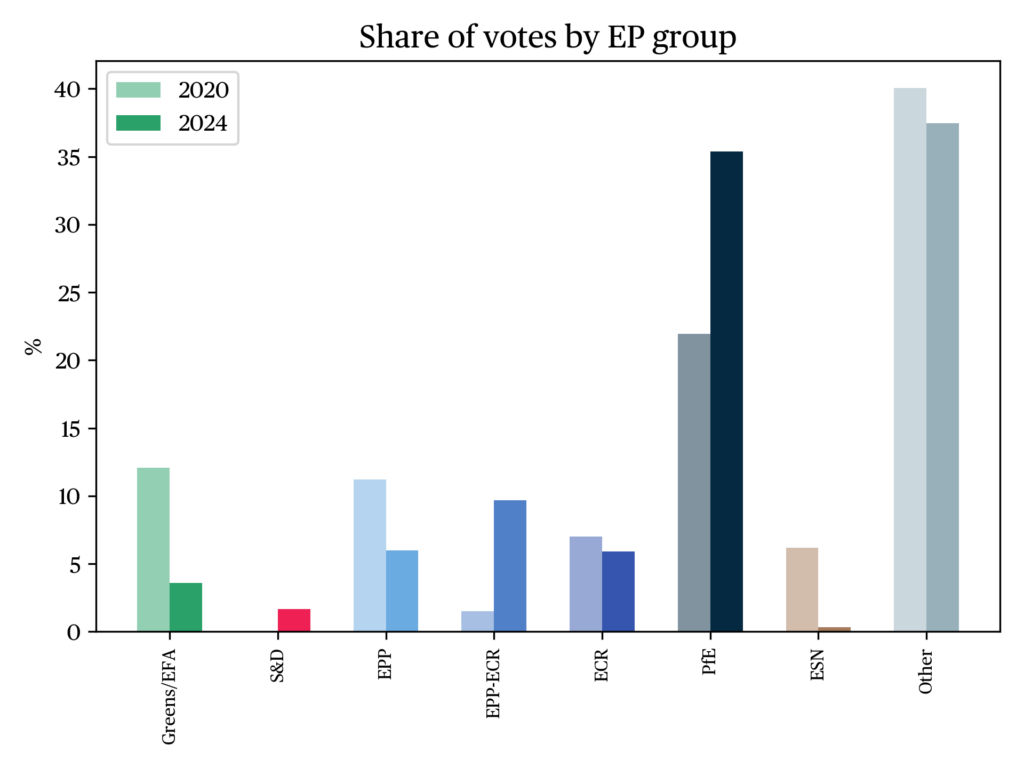
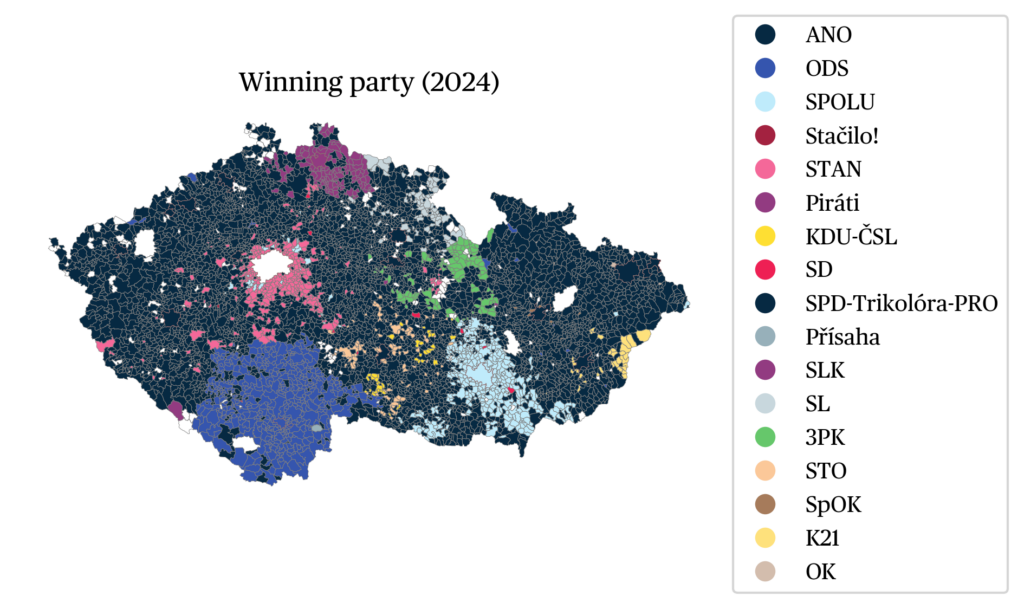
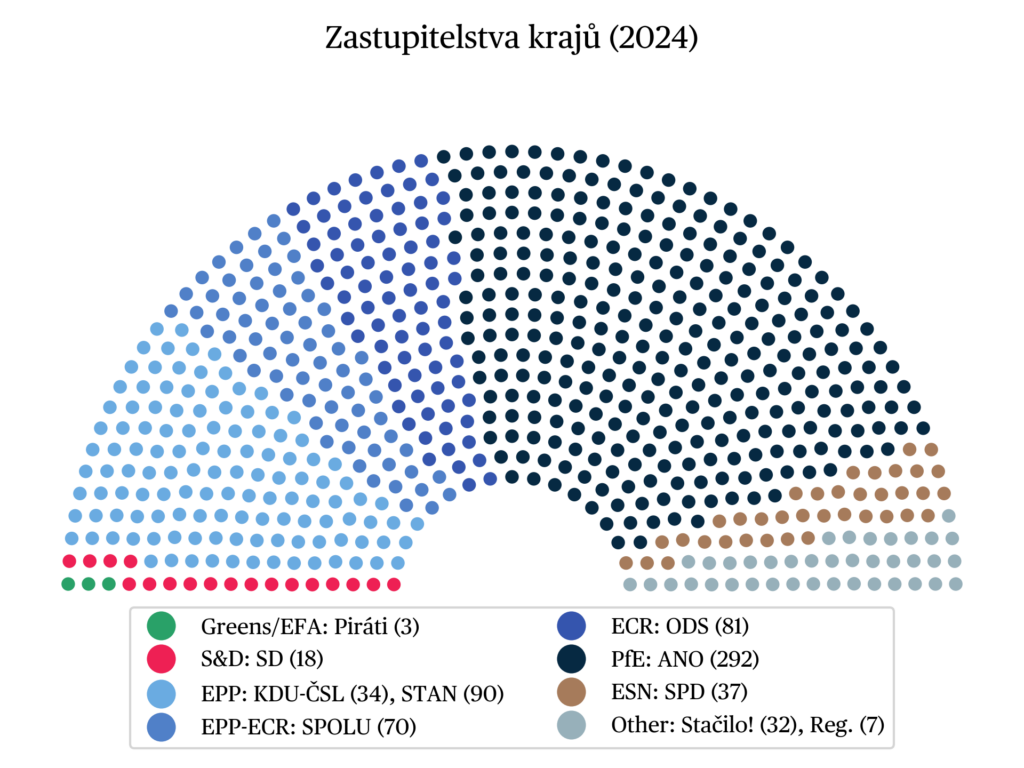
References
Act 129/2000, Zákon č. 129/2000 Sb. Zákon o krajích (krajské zřízení).
Act 247/1995, Zákon č. 247/1995 Sb. Zákon o volbách do Parlamentu České republiky a o změně a doplnění některých dalších zákonů.
Červenka, J. (2024, 11 September). Důvěra ústavním institucím – léto 2024. Centrum pro výzkum veřejného mínění.
Petrů, V. (2024, 11 November). Novým předsedou Pirátů je Hřib. Stranu chce posunout do středu. Deník Referendum.
Stuchlíková, L. (2023, 16 August). Rekordní nedůvěra ve vládu. Fialovi už nevěří ani vlastní voliči. Seznam Zprávy.
volby.cz (2024). Election results. Český Statistický Ůřad.
Notes
citer l'article
Michal Kubát, Michal Pink, Regional and Senate Elections in the Czech Republic, September 2024, Jun 2025,
à lire dans cette issue
voir toute la revue





